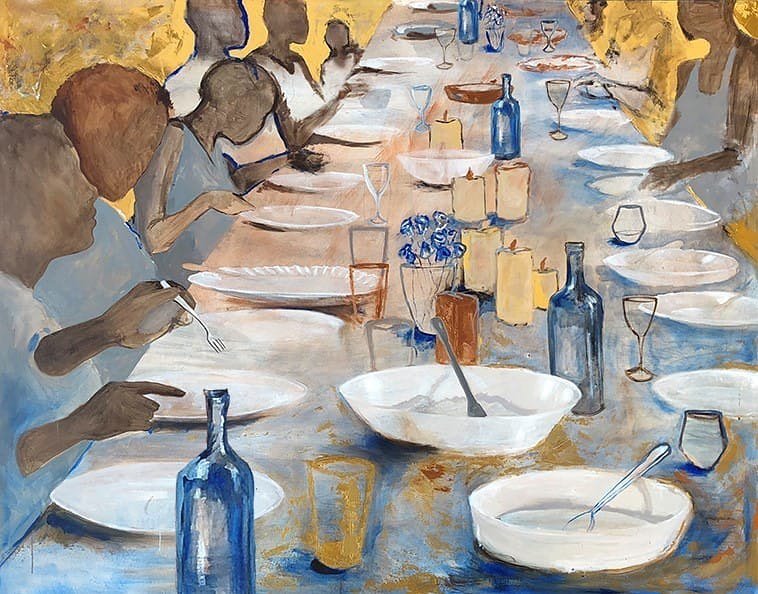
Imaginary Worlds
Honoring Racialised Black British Chefs and Culinary Traditions, Past and Present
October 3 — October 31, 2025
Various Locations Throughout London
Dinner with Ancestors. Xavier Daniels. 2019.
From Genesis to Revelation, the biblical narrative is peppered with stories of food and feasts.*
In Imaginary Worlds: Honoring Racialised Black British Chefs and Culinary Traditions, Past and Present, a multimedia exhibit offers a cultural retelling of Luke 14:15-24 and a contemplative theological journey exploring resistance, tradition, ingenuity, rehumanization and celebration, while paying homage to racialised Black British chefs who’ve contributed to—and reshaped—England’s culinary landscape.
Throughout October, invited chefs will host intimate dinners—at restaurants, museums and the spaces of partner organizations throughout London—that imagine and reimagine the culinary techniques and traditions that enslaved persons of African descent introduced to the English régime.
Imaginary Worlds will also feature Love from the Kitchen, a companion exhibit boasting a collection of paintings, photographs and video installations documenting the stories of racialised Black British clergy and church members who share their culinary memories plus special recipes passed down from generation to generation.
Guests attending the opening night reception will receive a limited-edition, complimentary cookbook filled with narratives and family recipes from 100 British chefs of African descent.
Join us in community as we honor—with biblical flavor—the culinary contributions and heritages of racialised Black chefs influencing British cuisine.
With generous support from The Church of England, Imaginary Worlds is presented by Churches Together in Britain and Ireland’s Justice and Inclusion division in collaboration with Roots for Churches, the Leeds Church Institute, St. Anne’s Gospel Choir, Chef Adejoké Bakare, Bibles and Brunch, and Raddish Kids.
*This invitation is a mock-up.
“Food is a perfect way to talk about these hard histories…Slavery endeavored to stamp out the culture and identities of enslaved people…Yet, African people held onto their foodways. Though forcibly uprooted and displaced across great distances, they carried their traditions, skills and ideas about food with them. [And] their descendants continued to do so, over generations…”
—Dr. Peggy Brunache
“Due to racism, some ethnic cuisines are associated with poverty or low socioeconomic status, which further stigmatizes the culinary contributions of several communities. This creates a perception of the food being tied to lower-quality or “less sophisticated” forms of expression, even when the dishes themselves are rich in history and culinary techniques. This has led to some people of colour being made to feel ashamed of their cultural food growing up. And by way of example, Black cuisine, particularly in the U.K. and parts of Africa, are often either marginalized as a consequence.”
—Eats By Will